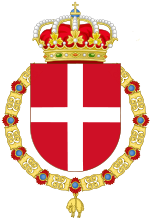Regiment of Saboya
| Regimiento de Infantería Mecanizada "Saboya" nº 6 (6th Mechanized Infantry Regiment “Saboya”) |
|
|---|---|

Coat of Arms of the Regiment Saboya
|
|
| Active | 1537–present |
| Country |
|
| Branch |
|
| Type | Mechanized infantry |
| Role | Front-line |
| Size | 2 battalions |
| Garrison/HQ | Bótoa, Badajoz |
| Nickname(s) | The terror of the French |
| Engagements | Battle of Saint-Quentin, War of the Spanish Succession, Battle of Villaviciosa, Spanish–Portuguese War (1776–77), War of the Oranges, Peninsular War, Battle of Tudela, First Siege of Zaragoza, Battle of Alcañiz, Third Siege of Gerona, Mexican War of Independence, First Carlist War, Hispano-Moroccan War (1859–60), Third Carlist War, Cuban War of Independence, Second Melillan campaign. |
| Commanders | |
| Notable commanders |
|
The 6th Mechanized Infantry Regiment “Saboya” (Spanish: Regimiento de Infantería Mecanizada "Saboya" nº 6) is a mechanized infantry unit in the Spanish Army.
It was created as the Tercio of Savoy by Charles I on 1537, and was developed from the former Tercio of Lombardía. In 1707, by Royal Order of His Majesty Philip V of Spain, first king of the House of Bourbon in Spain, changed its name to Regiment of Savoy Nº 3. With its new name participated in the War of the Spanish Succession with two battalions.
Its first commander was Álvaro de Sande, first Marqués de la Piovera. The patron saint of the regiment was Our Lady of the Rosary.
A white cross in red (gules) field. The shield, surrounded by the order of the Golden Fleece and surmounted by a royal crown. These arms are those of the Duchy of Savoy from which it took its name.
It saw combat in Italy, Flanders and most European campaigns. In 1813 it was moved to America and fought in Mexico and in the Viceroyalty of the Río de la Plata. During the First Spanish Republic it was renamed 6th Infantry Regiment.
...
Wikipedia
